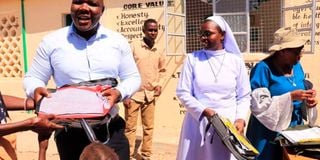Why Turkana County is recording rise in new HIV infections

Turkana Medical Services Chief Officer Gilchrist Lokoel (left)presents a gift to one of the 27 HIV Exposed Infants who were declared virus-free at St Mary’s Dispensary in Kalokol.
What you need to know:
- A majority of men in the county are also not embracing Voluntary Medical Male Circumcision (VMMC), which provides significant reductions in the risk of female-to-male HIV transmission.
- VMMC protects against HIV infection by safely removing the foreskin, which is susceptible to infection. It is recommended by the World Health Organization (WHO). According to WHO, a re-examination of evidence shows that VMMC remains an important intervention alongside other effective behavioural and biomedical HIV prevention interventions.
An increase in the number of new HIV infections in Turkana County has worried health authorities. HIV incidence in the county is currently at 5.6 per cent up from 3.2 per cent in 2022, according to statistics from National Syndemic Diseases Control Council.
County Medical Services Chief Officer Gilchrist Lokoel said more than 20,000 people are living with HIV in the county, with the highest percentage of infections being among women.
“We attribute the rising number of new infections to lack of awareness, low access to HIV prevention, care and treatment services, funding gap as well as stigma that has continued to impede prevention and care programmes.
He added that some residents are also not interested in knowing their HIV status yet they engage in high-risk behaviours such as unprotected sex.
Dr Lokoel noted that a majority of men in the county are also not embracing Voluntary Medical Male Circumcision (VMMC), which provides significant reductions in the risk of female-to-male HIV transmission.
“Turkana community does not embrace circumcision as a rite of passage. However , VMMC is recommended in health facilities to help in the fight against HIV. But the uptake is very low,” he regretted.
VMMC protects against HIV infection by safely removing the foreskin, which is susceptible to infection. It is recommended by the World Health Organization (WHO). According to WHO, a re-examination of evidence shows that VMMC remains an important intervention alongside other effective behavioural and biomedical HIV prevention interventions.
The chief officer said among those living with HIV, the total number of people on antiretroviral therapy (ART) are 10,708, representing 60 per cent.
However, he warned that most of those on ART are not taking medication as prescribed to suppress the virus as currently only 4,166 (24.5) percent are on the right track.
“To be on the safe side as a county we should ensure that 95 per cent of those receiving HIV clinical care are virally suppressed. This will help curb HIV/Aids related deaths,” Dr Lokoel said.
He noted that most adolescents living with HIV (aged between 10 -19 years) were not accessing ARVs due to stigma.
The official added that the county government has also been keen on reducing mother-to-child HIV transmission. This is after it emerged that the prevalence rate of transmission of HIV from mothers living with the virus to their children in the county is currently at 13.5 per cent above the national average of 9.7 per cent.
He urged women to deliver in health facilities, noting that home deliveries are the greatest contributor to mother-to-child HIV transmission.
“Mother-to-child HIV transmission will reduce significantly if expectant women make use of health facilities. Children of women living with HIV are at risk of infection during pregnancy, delivery and breastfeeding. To protect these children, the county government has made uptake of prevention of mother-to-child transmission (PMTCT) services among HIV-positive pregnant women a priority,” Dr Lokoel said.
He said there are prevention centres in the county where pregnant women and their children are offered antiretroviral therapy.
He reiterated the need for consistency in the supply of Early Infant Diagnosis (EID) commodities to facilitate timely testing of HIV-exposed infants and initiate corrective measures where necessary.
Last week, 27 HIV exposed infants were declared virus-free at St Mary’s Dispensary in Kalokol town during a graduation that was graced by county First Lady Lilian Lomorukai.
Dr Lokoel said the event was a testament that mothers had resolved to adhere to antenatal care visits, delivering in health facilities and ensuring that their children also take their drugs.
Turkana Central Sub-county Medical Officer of Health Amos Ekitela called on the mothers whose children had graduated to be advocates of the Prevention of Mother to Child Transmissions programme in villages.
Sister Doris, the Medical Coordinator at Diocese of Lodwar, congratulated the women for following the PMTCT programme.
She urged all women to be attending antenatal care and to deliver in health facilities.
At St Catherine’s Dispensary in Napetet , a total of 72 HIV exposed infants were also declared virus-free.
USAID Imarisha Jamii official Joseph Ekuam emphasised on stepping up HIV testing and doing follow-ups to reduce the number of people defaulting from antiretrovirals, adding that they are supporting HIV care and treatment in 52 sites across the county.
The First Lady urged the national government to consider supporting people living with HIV, particularly mothers from poor backgrounds, through social protection services such as relief food and cash transfer programmes.
She noted that the move will encourage more women to be tested as it would mean testing, treatment and feeding.





